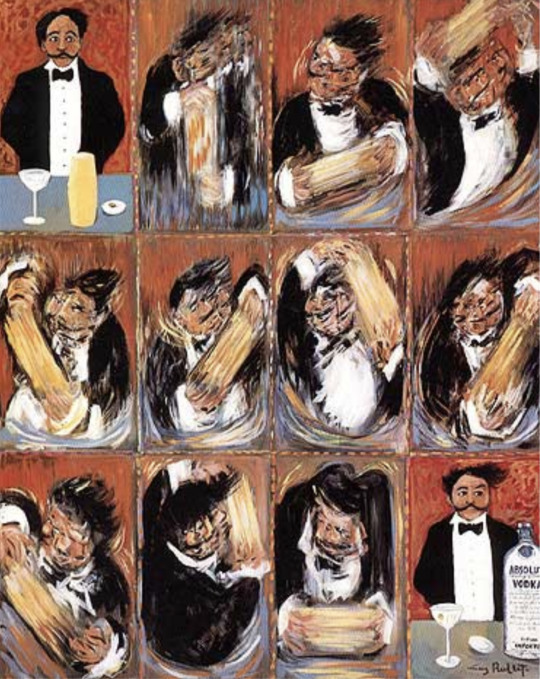Text
Hateful Is the Dark-Blue Sky
Hateful is the dark-blue sky,
Vaulted o’er the dark-blue sea.
Death is the end of life; ah, why
Should life all labor be?
Let us alone. Time driveth onward fast,
And in a little while our lips are dumb.
Let us alone. What is it that will last?
And things are taken from us, and become
Portions and parcels of the dreadful past.
Let us alone. What pleasure can we have
To war with evil? Is there any peace
In ever climbing up the climbing wave?
All things have rest, and ripen toward the grave
In silence – ripen, fall, and cease:
Give us long rest or death, dark death, or dreamful ease.
- Alfred Lord Tennyson, from "The Lotus-Eaters"
#Alfred Lord Tennyson#poetry#poem#Hateful Is the Dark-Blue Sky#Should life all labor be#life#existential#work#labour#sleep#rest#neoliberalism#capitalism#past#Kierkegaard#anxiety#slipping#time#present
1 note
·
View note
Text
The most certain test by which we can judge whether a country is really free is the amount of security enjoyed by minorities.
Lord Acton (John Emerich Edward Dalberg-Acton), historian (10 Jan 1834-1902)
Source: Wordsmith
#Lord Acton#quote#freedom#free#country#minorities#equality#equal rights#democracy#politics#national#progress
0 notes
Text
What an artist is trying to do for people is bring them closer to something, because of course art is about sharing: you wouldn't be an artist if you didn't want to share an experience, a thought.
David Hockney
#David Hockney#quote#art quote#connection#connecting#sharing#thoughts#insights#experience#what is art
4 notes
·
View notes
Text
Sonnet 29
When, in disgrace with fortune and men’s eyes,
I all alone beweep my outcast state,
And trouble deaf heaven with my bootless cries,
And look upon myself and curse my fate,
Wishing me like to one more rich in hope,
Featured like him, like him with friends possessed,
Desiring this man’s art and that man’s scope,
With what I most enjoy contented least;
Yet in these thoughts myself almost despising,
Haply I think on thee, and then my state,
(Like to the lark at break of day arising
From sullen earth) sings hymns at heaven’s gate;
For thy sweet love remembered such wealth brings
That then I scorn to change my state with kings.
#William Shakespeare#Shakespeare#sonnet#sonnet 29#love#poetry#poem#happiness#depression#envy#jealousy#jealous#happy
0 notes
Text
The unrestricted competition so commonly advocated does not leave us the survival of the fittest. The unscrupulous succeed best in accumulating wealth.
Rutherford B. Hayes, 19th US president (4 Oct 1822-1893)
Source: Wordsmith
#Rutherford B. Hayes#quote#US president#competition#capitalism#narcissism#wealth#wealth hoarding#money#freeloaders#leaders#competitive#Dark Triad
1 note
·
View note
Text
The man who is denied the opportunity of taking decisions of importance begins to regard as important the decisions he is allowed to take.
C. Northcote Parkinson, author and historian (1909-1993)
Source: Wordsmith
#C. Northcote Parkinson#quote#power#importance#VIP#decisions#decision-making#politics#society#individuals#government#bureaucracy#zeggenschap
2 notes
·
View notes
Text
Briefly stated, the Gell-Mann Amnesia effect is as follows. You open the newspaper to an article on some subject you know well. In Murray's case, physics. In mine, show business. You read the article and see the journalist has absolutely no understanding of either the facts or the issues. Often, the article is so wrong it actually presents the story backward—reversing cause and effect. I call these the "wet streets cause rain" stories. Paper's full of them.
In any case, you read with exasperation or amusement the multiple errors in a story, and then turn the page to national or international affairs, and read as if the rest of the newspaper was somehow more accurate about Palestine than the baloney you just read. You turn the page, and forget what you know.
- Michael Crichton, American author
#Michael Crichton#quote#media#newspapers#science#scientists#journalism#journalists#misinformation#correlation#report#reporting#reports#ignorance#mistakes#errors#wrong#belief
2 notes
·
View notes
Text
This be the verse
They fuck you up, your mum and dad.
They may not mean to, but they do.
They fill you with the faults they had
And add some extra, just for you.
But they were fucked up in their turn
By fools in old-style hats and coats,
Who half the time were soppy-stern
And half at one another’s throats.
Man hands on misery to man.
It deepens like a coastal shelf.
Get out as early as you can,
And don’t have any kids yourself.
Philip Larkin
#Philip Larkin#poem#poetry#this be the verse#parents#funny#intergenerational trauma#generations#trauma#childhood#raising#children#kids#misery
8 notes
·
View notes
Photo

Guy Buffet - Making of a perfect martini
#Guy Buffet#art#advertisement#cocktail#cocktail shaking#cocktails#martini#absolut#vodka#drink#drinks#bartender#painting#funny#movement#moving
9 notes
·
View notes
Quote
Men believe they are free for the reason that they are aware of their actions and ignorant of the causes by which they are determined.
//
Men think themselves free, because they are conscious of their volitions and their appetite, and do not think, even in their dreams, of the causes by which they are disposed to wanting and willing, because they are ignorant of [those causes].
Baruch Spinoza, Epistemology and Philosophy of Mind
#Baruch Spinoza#Spinoza#quote#freedom#causes#human mind#human minds#thought#understanding#cognition#causal#intention#free will#free#determinism#Epistemology and Philosophy of Mind#philosophy of mind
6 notes
·
View notes
Quote
I have noticed that when all the lights are on, people tend to talk about what they are doing – their outer lives. Sitting round in candlelight or firelight, people start to talk about how they are feeling – their inner lives. They speak subjectively, they argue less, there are longer pauses. To sit alone without any electric light is curiously creative. I have my best ideas at dawn or at nightfall, but not if I switch on the lights – then I start thinking about projects, deadlines, demands, and the shadows and shapes of the house become objects, not suggestions, things that need to done, not a background to thought.
Jeanette Winterson, English author
#Jeanette Winterson#quote#electric light#electricity#light#lamps#candle#candles#thought#creativity#creative#thinking#sharing#feeling#feelings#emotions#emotional#fire#campfire#talking#conversation#humans#warm#warmth
14 notes
·
View notes
Quote
Under the present brutal and primitive conditions on this planet, every person you meet should be regarded as one of the walking wounded. We have never seen a man or woman not slightly deranged by either anxiety or grief. We have never seen a totally sane human being.
Robert Anton Wilson
#Robert Anton Wilson#Robert Wilson#quote#human condition#humans#human#human experience#man#woman#grief#anxiety#insanity#sanity#sane#difficulty#difficult#emotions#emotional maturity#understanding#kindness#kind#wounded#hurt#battle#perspective#ToM
13 notes
·
View notes
Text
Social issues; individual blame
“The risk of the medicalised approach to suffering is that it can dissolve collective experience, dispersing our shared causes of distress into individual dysfunctions. This prevents us to experience suffering as a community, and to act to change.” - source
Full excerpt: “While many humanistic psychologists never intended their views on suffering to also apply to social change, it is true that communities must endure similar painful confrontations with reality before social reform can follow. When a group wakes up and understands the causes of its predicament, social and political action then becomes possible. ‘And this is what we witness time and again,’ said [psychologist Tim] Kasser. ‘Suffering is what ultimately motivated the civil rights movement of the 1960s. It also drove the women’s liberation movement of the 1990s. In these cases groups of people experienced their distress acutely, but they also experienced it as a community. And this helped them find their collective political purpose, enabling organisers to unite them behind a shared agenda for social change.’ The trouble with the medicalised approach, on the other hand, is that it dissolves collective experience, dispersing our socially caused and shared distress into different, individual, self-residing dysfunctions. In this way, diagnostic tribes come to replace political tribes, as we identify with a given mentally ill social grouping. Now our suffering has been politically defused. Then follows an emphasis on self rather than social reform, which is facilitated by individualist treatments.”
Excerpt from ‘Sedated: How Modern Capitalism Created our Mental Health Crisis’ by James Davies, Chapter 9 ‘Dehumanising productivity’
#Sedated#James Davies#book excerpt#quote#individualisation#individualization#individualism#individual#social#social issues#modernity#capitalism#dehumanisation#Tim Kasser#collective#collective experiences#health#wellbeing#psychological wellbeing#mental health#Western society#society#medical#suffering#dysfunction#mental disorder#community
2 notes
·
View notes
Photo

“Loofhuttenfeest in den vreemden” (Feast of Tabernacles with strangers),1863 by Hein Burgers (1834-1899); Jewish historical museum, Amsterdam.
#Loofhuttenfeest in den vreemden#Hein Burgers#painting#18th century#art#Jewish historical museum#Amsterdam#Jewish quarter#people#city#Dutch painting#Dutch#poignant#Jewish
27 notes
·
View notes
Quote
Every miserable fool who has nothing at all of which he can be proud, adopts as a last resource pride in the nation to which he belongs; he is ready and happy to defend all its faults and follies tooth and nail, thus reimbursing himself for his own inferiority.
Arthur Schopenhauer
#Arthur Schopenhauer#quote#nationalism#extremism#polarisation#politics#national#nationality#identity#group#group identity#pride#proud#empty#inferior#inferiority
4 notes
·
View notes
Text
My Mother
They are killing her again.
She said she did it
One year in every ten,
But they do it annually, or weekly,
Some even do it daily,
Carrying her death around in their heads
And practising it. She saves them
The trouble of their own;
They can die through her
Without ever making
The decision. My buried mother
Is up-dug for repeat performances.
Now they want to make a film
For anyone lacking the ability
To imagine the body, head in oven,
Orphaning children. Then
It can be rewound
So they can watch her die
Right from the beginning again.
The peanut eaters, entertained
At my mother’s death, will go home,
Each carrying their memory of her,
Lifeless – a souvenir.
Maybe they’ll buy the video.
Watching someone on TV
Means all they have to do
Is press ‘pause’
If they want to boil a kettle,
While my mother holds her breath on screen
To finish dying after tea.
The filmmakers have collected
The body parts,
They want me to see.
They require dressings to cover the joins
And disguise the prosthetics
In their remake of my mother.
They want to use her poetry
As stitching and sutures
To give it credibility.
They think I should love it –
Having her back again, they think
I should give them my mother’s words
To fill the mouth of their monster,
Their Sylvia Suicide Doll,
Who will walk and talk
And die at will,
And die, and die
And forever be dying.
Frieda Hughes, about her mother Sylvia Plath
Published in The Stonepicker and The Book of Mirrors
#Frieda Hughes#poetry#Sylvia Plath#Ted Hughes#poem#mother#suicide#death#unaliving#unalive#TV#entertainment#sad#sorrow#memories#parasocial
16 notes
·
View notes
Quote
If you look for truth, you may find comfort in the end; if you look for comfort, you will not get either comfort or truth only soft soap and wishful thinking to begin, and in the end, despair.
C.S. Lewis
#an inconvenient truth#C.S. Lewis#quote#truth#comfort#comforting#true#thinking#understanding#lies#lying#wishful thinking
4 notes
·
View notes